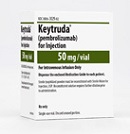So far this year, Bristol-Myers Squibb's ($BMY) Opdivo has grown about two times faster than Merck & Co.'s ($MRK) Keytruda, to $305 million and $159 million in third-quarter sales, respectively. And the FDA helped that trend along this month, when it gave Opdivo a new approval in non-small cell lung cancer several months early--just a week after Keytruda won its NSCLC green light.
And after all, Bristol-Myers boasts data showing Opdivo helps lung cancer patients live longer, and by a substantial margin.
But a new recommendation in the National Comprehensive Cancer Network's influential treatment compendium--along with newly minted data showing Keytruda helped extend lung cancer patients' lives--could help re-level the playing field, analysts figure.
 One key difference between Keytruda and Opdivo at this point is that the Merck drug has a more limited approval in lung cancer than its rival does. Bristol-Myers can market Opdivo for all lung cancer patients, regardless of whether they've tested positive for the PD-L1 biomarker. Keytruda's population is limited to PD-L1-positive patients.
One key difference between Keytruda and Opdivo at this point is that the Merck drug has a more limited approval in lung cancer than its rival does. Bristol-Myers can market Opdivo for all lung cancer patients, regardless of whether they've tested positive for the PD-L1 biomarker. Keytruda's population is limited to PD-L1-positive patients.
But the NCCN's treatment guidelines blunted that difference a bit. As Bernstein analyst Tim Anderson pointed out in an investor note earlier this week, the compendium recommended Keytruda for NSCLC patients who express PD-L1, whether that's only slightly--1% at the low end--or quite a bit. The group could have limited its recommendation to those whose PD-L1 levels came in at 50% or more, based on some of Keytruda's trial data.
That blessing isn't as helpful as it might have been; as Anderson notes, NCCN could have backed Keytruda for all patients, regardless of PD-L1 status, as it did for Opdivo. But it's better than some had expected.
And what that means for Merck is that it's more likely to chip away at Opdivo's lead. Bernstein figures that Keytruda's lung cancer sales estimates were probably too low already, and with this NCCN recommendation, even more so.
Meanwhile, Merck may soon have the chance to tout overall survival data as BMS does, thanks to the Keynote-010 trial, whose top-line results came out this week. According to the company, PD-L1-positive NSCLC patients taking Keytruda lived longer without their disease progressing--and lived longer, period--than those using the chemotherapy docetaxel.
The actual magnitude of that survival benefit won't be public till the full study data are presented, sometime "in the near future," Merck says. It's planning to share the data with the FDA, too, and adding that info to Keytruda's label could give it a marketing boost.
The survival data "should allow Merck … to expand Keytruda use" beyond the group of patients with PD-L1 expression of 50% or more, Evercore ISI analyst Mark Schoenebaum said in a note about the trial results. About 60% of second-line NSCLC patients have a PD-L1 level of 1% or more, he notes, quoting Merck stats.
"We expect that, based on Merck's plans to submit the data to the FDA in late '15," the survival data could reach the Keytruda label during the second half of next year, "which could help to level the playing field in 2nd line NSCLC."
But there's a hurdle between Keytruda and access to more NSCLC patients--the PD-L1 diagnostic test, which isn't routinely administered right now, Anderson notes.
"[I]t remains to be seen how the commercial battle between Merck and BMS will play out along these lines," he wrote. "While making a biomarker argument in the treatment of cancer is more elegant, it is certainly more practical not to have to measure biomarkers at all, meaning Bristol-Myers is indeed better positioned."
- see the Merck release
Special Reports: Top 15 pharma companies by 2014 revenue - Merck